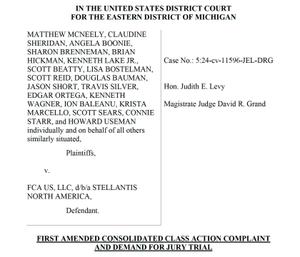27.05.2025
From Glitch to Courtroom – When Infotainment Defects Become Legal Liabilities
While software bugs in infotainment systems often begin as technical nuisances, they can escalate quickly. For automotive OEMs, these defects are no longer just engineering problems — they're legal risks. In recent years, a growing number of consumers have taken legal action, alleging that infotainment defects not only diminish the driving experience but also compromise safety, violate consumer protection laws, and lower vehicle resale value.
The result? High-profile class-action lawsuits, some settled for millions, others still in litigation, and all of them a stark warning for manufacturers who underestimate the business impact of software quality.
Stellantis: Uconnect 5 System at the Center of New Legal Firestorm (Ongoing)

In 2024, Stellantis became the latest automaker to face a major class-action lawsuit over its infotainment system. Filed in the U.S. District Court, the amended complaint accuses Stellantis of knowingly selling vehicles with defective Uconnect 5 infotainment systems across several brands, including Jeep, Dodge, and Chrysler.
Drivers report frequent system crashes, audio failures, touchscreen freezes, GPS inaccuracy, and backup camera malfunctions. The plaintiffs allege that these defects create safety hazards and have been met with insufficient software patches or outright denials of the issue by dealerships. The case remains ongoing as of early 2025, but the scope of affected models could expose Stellantis to significant financial damages.
Honda: Multiple Legal Battles Over Failing Infotainment Systems
Honda is no stranger to infotainment-related litigation. A class-action lawsuit filed in August 2024 targets newer models of the Pilot, Passport, and Odyssey, alleging that the infotainment system suffers from a range of malfunctions, including intermittent audio loss, system resets, and flickering displays.
🔗 Case summary
This legal action follows an earlier case, now settled, involving similar defects in earlier model years. Honda agreed to a settlement that offered affected owners compensation for repair costs, additional benefits, and an extended warranty.
🔗 Settlement details
Subaru: $6.25 Million Settlement for Starlink Defects
Subaru’s Starlink infotainment system, installed in several 2017–2018 model year vehicles, was the subject of a class-action lawsuit that claimed it was defective by design. The system allegedly suffered from unresponsive touchscreens, backup camera hiccups, frequent freezing, and audio failures.
Rather than contest the allegations in court, Subaru agreed to a $6.25 million settlement, impacting owners across six models including the Outback, Forester, and Crosstrek. The case serves as a costly reminder of how widespread infotainment defects can spiral into mass legal action.
🔗 Case overview
A new class-action lawsuit emerged in 2023, centered on Subaru vehicles from model years 2019 to 2023, which were reported to have comparable issues with the Starlink infotainment system.
Mazda: Legal Repercussions for a Decade of Faulty Software
In February 2025, Mazda agreed to a settlement in a class-action lawsuit covering the Mazda Connect infotainment system. Plaintiffs alleged that models from 2014 through 2023 experienced chronic issues: constant rebooting, lagging UI, failed Bluetooth and GPS connections, and rearview camera malfunctions.
The litigation, filed by a coalition of five law firms, emphasized that Mazda failed to acknowledge the severity of the issue for nearly a decade. The case represents one of the broadest timeframes and model ranges seen in infotainment-related lawsuits. As part of the settlement, Mazda committed to a warranty extension, reimbursement of eligible out-of-pocket expenses for affected vehicles, and the payment of $1.9 million in attorney fees.
🔗 Settlement notice
What These Cases Have in Common
Across brands and continents, these lawsuits reveal a troubling pattern:
- OEMs are consistently slow to acknowledge systemic infotainment defects.
- Technical service bulletins or software patches often fail to resolve issues.
- Consumers cite safety concerns, inconvenience, and financial loss — not just poor UX — as the basis for their claims.
- Legal exposure grows exponentially when a bug is found in a system that's widely deployed across platforms and model years.
Even when settlements avoid an admission of fault, the reputational and financial cost is significant. For example, legal fees, repair reimbursements, and goodwill gestures can total tens of millions of dollars, not to mention lost customer trust.
Takeaway:
Infotainment issues are no longer contained within the service bay or dealership complaints. They’re making their way into courtrooms. And unless OEMs rethink how they validate and monitor software quality, these problems will continue to turn into class actions that stain brands and drain balance sheets.
Next in our blog article series: Are OEMs meeting customer expectations, and if not, what are the consequences?
Other articles in this series:
- Chapter 1: Software as the New Root Cause – The Rise of Infotainment and Software-Driven Recalls
- Chapter 2: When Code Breaks Safety – Infotainment and Cluster Failures Behind Growing Recalls
- Chapter 4: The Hidden Cost – Customer Frustration, Delays, and Brand Erosion
- Chapter 5: Why Software Defects Keep Slipping Through – The Core Problems Behind OEM QA Failures
- Chapter 6: Software Quality as a Competitive Advantage: Lessons from the Infotainment Crisis


